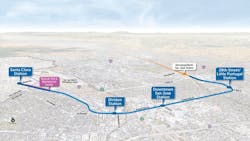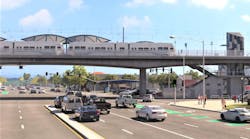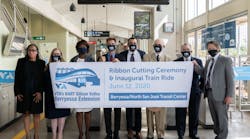MTC to allocate $375 million to Phase II of Santa Clara VTA's BART Extension Project
The Metropolitan Transportation Commission (MTC) has voted to allocate $375 million for Phase II of the Santa Clara Valley Transportation Authority's (VTA) Silicon Valley Bay Area Rapid Transit (BART) Extension Project.
Funding for the project began in 2000 with the passing of Measure A, a 30-year half-cent (0.005 percent) sales tax devoted to specific public transit capital improvement projects and operations. Among the many projects identified for 2000 Measure A funds, approximately $1.2 billion, was used to fund the construction of Santa Clara VTA’s BART Phase I Extension (which opened in 2020) and additional funding has been earmarked to fund construction of VTA’s BART Phase II Extension.
In 2008, Santa Clara County voters doubled down on their commitment to funding Santa Clara VTA’s BART Silicon Valley Program by passing the 2008 Measure B, eighth of a cent (0.00125 percent) sales tax dedicated to funding operations of the program.
In 2016, 71 percent of voters supported additional funding for Santa Clara VTA’s BART Silicon Valley Program, as well as highway, expressway and other transit projects with the passing of the 2016 Measure B, a second 30-year half-cent (0.005 percent) sales tax. In total, Santa Clara County local sales tax measures are funding an estimated $4.3 billion for construction of Santa Clara VTA’s BART Silicon Valley Program.
In 2018, Bay Area residents approved Regional Measure 3 (RM3), which is anticipated to raise $4.45 billion to finance highway and transit improvements. This funding includes the purchase of new BART cars, extending Caltrain to downtown San Francisco and $375 million towards the construction of Santa Clara VTA’s BART Silicon Valley Program.
Historically, the San Francisco Bay Area has demonstrated a willingness and desire to fund transportation and transit improvement projects, with RM3 as the third such measure passed by the residents of the nine Bay Area counties. Prior measures include Regional Measure 1 (1988) and Regional Measure 2 (2004), which provided funding for several major infrastructure improvements, including the rehabilitation of numerous bridges throughout the Bay, construction of San Francisco’s Central Subway, Interstate 80/680 interchange upgrades, e-BART extension to Pittsburg and Antioch, the BART-Oakland Airport Connector and BART’s extension from Fremont to Warm Springs.
The state of California's investment in transit
The state of California offers multiple competitive grant programs to fund local transportation and transit projects, including the Traffic Congestion Relief Program (TCRP) and the Transit and Intercity Rail Capital Program (TIRCP). Funding for TIRCP grants comes largely from the Greenhouse Gas Reduction Fund, an investment fund that supports the construction of transformative capital improvements that will modernize California’s transit systems while helping to curtail greenhouse gas emissions from automobile use.
In 2018, the TIRCP awarded Santa Clara VTA $750 million to fund Santa Clara VTA’s BART Silicon Valley Program. An additional $375 million was awarded to Santa Clara VTA for the Santa Clara VTA’s BART Silicon Valley Program following a state surplus, increasing state funding to $1.125 billion.
The Federal Transit Administration (FTA) has numerous funding programs for large transit projects, including its Capital Improvement Grant (CIG) program, which oversees the New Starts funding program.
VTA anticipates receiving a full funding grant agreement for approximately $6 billion, or approximately 50 percent of the total cost of Santa Clara VTA’s BART Silicon Valley Program in late 2024. Once that funding has been received, Santa Clara VTA will have secured the last remaining piece of funding for the Santa Clara VTA’s BART Silicon Valley Program.






